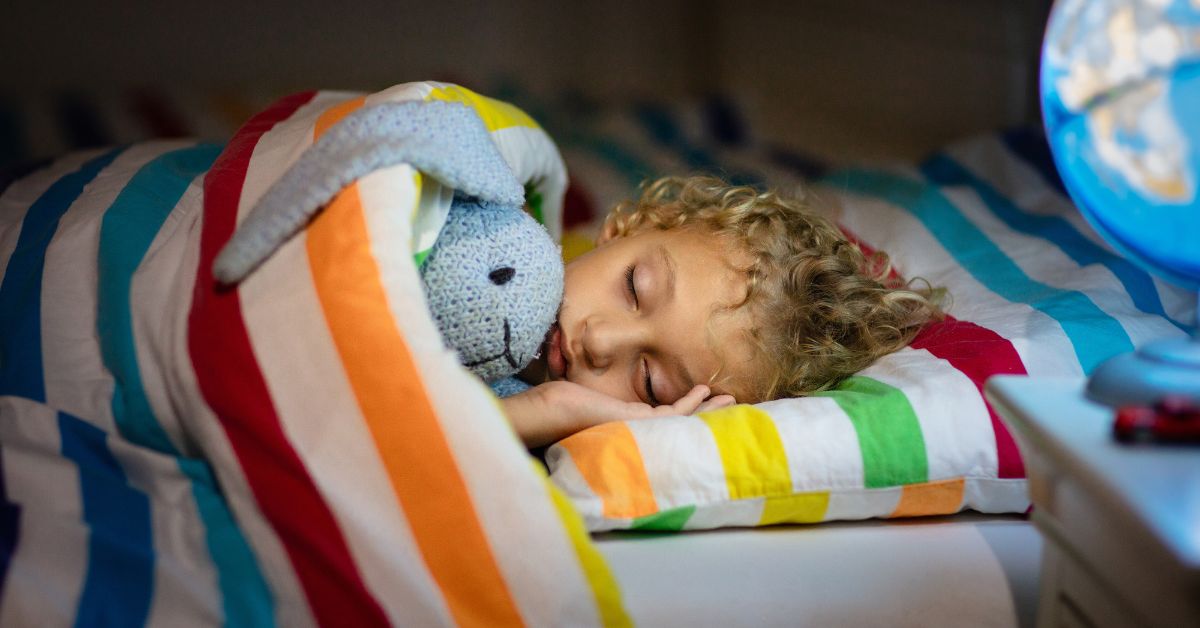Imagine your kid waking up each morning feeling refreshed and energized, all set for the day. As parents, we know the importance of quality sleep for your kid’s overall wellness. Research recommends that school-aged children need 9–12 hours of sleep for enhanced academic performance and overall well-being.
However, some surveys showed that a significant number of school-going kids are not taking sleep for the recommended duration, with as many as 30 percent of students experiencing insufficient sleep concerns. Amidst the distractions of modern life, getting a good night’s sleep feels like a challenge. However, the good news is that with some effective approaches, parents can help their little ones get a sound sleep at night.
Read below this article to find out ten effective tips and strategies to transform your kid’s sleep struggle into a peaceful experience.
10 Tips for Sound Sleep for Kids
From following a consistent bedtime routine to healthy eating habits, here are some of the most helpful strategies for making your little one have a proper goodnight sleep.
Consistent Bedtime Routine
Whether it’s reading their favorite bedtime story, enjoying a hot bath, or practicing some yoga, you can find simple activities for your kids to relax and prepare them for sleep. Overall, introducing a consistent bedtime routine will help regulate your kid’s internal clock while simultaneously boosting their sleep quality.
Limit screen time before bed
According to research, increased screen time before bed is often linked with shorter sleep duration and delayed sleep in kids. As parents, you can ask your kids to keep their digital gadgets aside at least one hour before going to bed. Meanwhile, you can share with them some bedtime stories, as this will help in nurturing the parent-child bond and promoting sound sleep in them.
Comfortable Sleep Environment
Having a comfortable and peaceful sleep environment is an important aspect when it comes to getting restful sleep. According to the Journal of Clinical Sleep Medicine, a comfortable sleep environment is linked with improved sleep duration and quality of sleep in adults and kids alike. Therefore, you can set up the right sleep environment by making sure it’s dark, quiet, and cool. You can even invest in some good pillows and mattresses for enhanced comfort.
Regular Exercise
Encourage your kids to follow a regular physical exercise routine, as it is known to promote sleep quality and lower the chances of sleep disturbances, particularly in kids. You can ask your kids to engage in swimming, yoga, or playing other outdoor games.
Say No to Caffeine
Does your little one enjoy sipping coffee in the afternoon? If yes, you need to be alarmed. Caffein intake in kids is known to interfere with kids’ sleep patterns and quality. Thus, you can ask your little one to avoid caffeine intake, which is usually present in beverages such as soda, energy drinks, coffee, or tea.
Sleep Schedule
A sleep of at least 9–12 hours is needed by school-going kids for better performance at school as well as to maintain overall health. Thus, setting up a consistent sleep schedule is a significant approach to ensuring adequate sleep duration for your kids.
Practice mindful activities
Relaxation and mindful activities, such as meditation, yoga, writing journals, listening to calming music, or even enjoying a warm cup of herbal tea, are great ways to ensure quality sleep in kids. These activities right before bed are perfect to relax, unwind, and prepare your kids to sleep.
Healthy eating habits
Did you know that eating heavy meals or sugary snacks before going to bed greatly interferes with sleep patterns and sleep duration? Thus, it is important to ensure healthy eating habits throughout the day and recipes that are rather light and nutritious that won’t interfere with your kid’s sleep.
Good sleep hygiene
Good sleep hygiene is another essential aspect when it comes to improving sleep quality in kids. Thus, it is important to teach your kids to keep their bedrooms clean, comfortable, and free of mess. You might also want to make sure they are not studying or eating on their beds to inculcate the right sleep hygiene values in them.
Keep an eye out for sleep disorders
Last but not least, if you notice any signs of restless sleep, daytime sleepiness, or snoring in kids, you might need to reach out to your doctor. These persistent sleeping signs might indicate an underlying concern. About 2 percent of kids suffer from obstructive sleep apnea, which is a common sleep disorder. Thus, consult the doctor if you notice such persistent symptoms to make sure your kid gets the right amount of sleep during the night.






